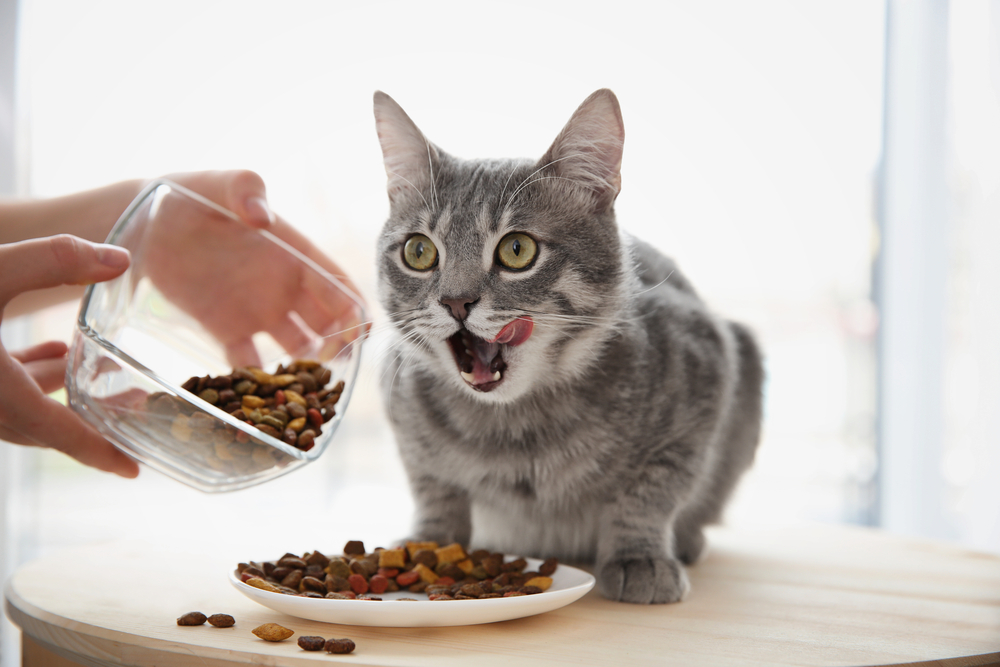When searching for the best food for your furry pal, you’re likely overwhelmed with all the conflicting opinions posing as facts, steering you in different directions. How is a pet owner to choose? Before purchasing a pet food, separate the facts from fiction, and unearth the truth about cat and dog nutrition. To help you on your pet-food journey, the Driftwood Animal Hospital team reveals the truth behind common pet nutrition myths. Of course, we are always available to help if you have specific questions about your pet’s diet, nutrition, and food—contact us for a nutrition consultation.
Myth: Holistic, organic, all-natural foods are the best for my pet
Truth: While these buzzwords are highly successful for making sales, they may not mean anything. The Food and Drug Administration (FDA) does not regulate the use of these words for pet foods, nor do they supply any legal definition that should be followed. Essentially, any pet-food manufacturer can slap the term “holistic” on their food, drive up the price, and attract business by preying on pet owners’ emotions. Since you naturally want to provide only the best for your beloved pet, you are likely drawn to the food brands that claim their products are good enough for you to eat. Unfortunately, there is no guarantee that these foods contain holistic, organic, or all-natural ingredients.
Myth: Corn is a cheap filler in pet food and shouldn’t be an ingredient
Truth: Corn is often touted as a cheap, indigestible filler in pet foods, but this statement couldn’t be any further from the truth. In fact, cats and dogs can digest and metabolize grains well, and corn is chock-full of proteins, vitamins, and minerals. Corn is also a great source of energy and antioxidants for pets. Antioxidants are essential for a healthy immune system, and corn has twice as many antioxidants as apples, ounce for ounce.
Myth: Since dogs are descended from wolves, they should only eat raw meat
Truth: How closely do you think your pug resembles a wolf? While your pooch may have lupine ancestors way back in the family tree, today’s dogs are vastly different from their wolfy counterparts. Their gastrointestinal tract has also changed over thousands of years of domestication, and most dogs will immediately develop gastritis after eating raw meat. Plus, you and your pet can be exposed to the bacteria in raw meat, making this a less-than-healthy diet option.
Myth: Animal by-products should never be in my pet’s food
Truth: When you hear the term “animal by-products,” what comes to mind? Is it hooves, feathers, and hair? Many pet owners believe by-products are the inedible animal parts in their pet’s food, but these ingredients are typically organ meats, such as the liver, kidneys, lungs, and spleen. Animals generally eat these organs first, as they instinctively know they are the most nutritious. Animal by-products are not only safe for your pet to eat, but they’re also an excellent source of protein and other nutrients.
Myth: Grain-free food will cure my pet’s allergies

Truth: One of the most common pet-food myths is that pets with allergies are automatically allergic to grains, especially corn. We have no idea how this myth originated, but we strongly dispel the notion, which can be dangerous to your dog’s health. Most allergic pets have environmental allergies, such as mold, pollen, and dust in their surroundings. True food allergies are rare, and allergies to grains are almost unheard of. If your pet develops a food allergy, they are much more likely to have an issue with the protein source, like chicken or dairy, than a grain. However, that does not stop pet owners from rushing out to purchase grain-free food for their itchy pet, since manufacturing companies have jumped on this marketing gold mine to pump out grain-free diets.
Here is where the grain-free food situation becomes tricky. The FDA is currently investigating heart-disease development in dogs that may be related to grain-free foods. Cases of dilated cardiomyopathy (DCM) have been cropping up in breeds that are not predisposed to this condition, and a major link seems to be grain-free, exotic ingredient, or boutique (BEG) diets. For example, diets created in someone’s home kitchen using kangaroo and peas undergo little regulation. Also, no research is available on how these exotic ingredients are metabolized in dogs, or if they can cause deadly side effects. Although a great deal of speculation surrounds the potential DCM-BEG diet link, the ongoing study has produced no conclusive evidence. Read more about the FDA’s report here.
Are you overwhelmed with the conflicting opinions regarding pet food and nutrition? Trust in our Driftwood Animal Hospital team to help make the best decision for your pet’s nutritional needs. Contact us to schedule an appointment.








Leave A Comment